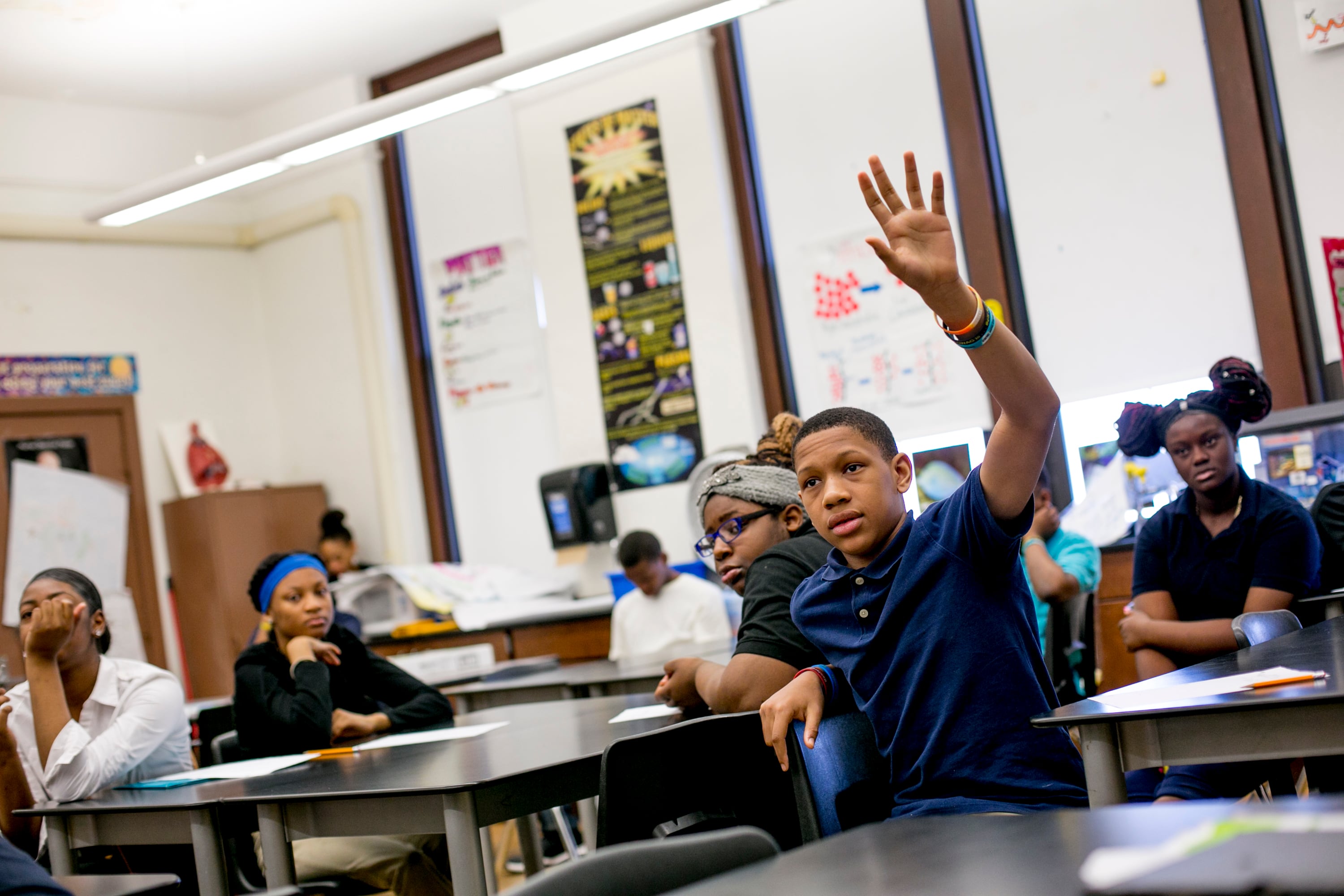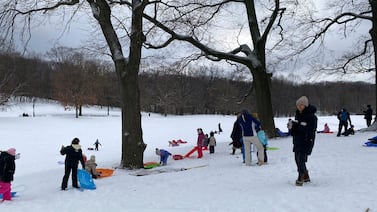In August, students in the state’s biggest school district will form a group to weigh in on the district’s social studies curriculum as part of a process to ensure course materials are equitable and representative of the majority-Black student body.
The new Social Studies Student Think Tank will serve as the main outlet for Detroit Public Schools Community District students to give suggestions and formulate initiatives to shape their own educational journey, said Elizabeth Triden, executive director of science and social studies for DPSCD’s Department of Curriculum.
“We know as a department, and as a field of education, that the materials available on the market for social studies are not reflective of our students,” said Triden. “So, we knew as soon as we adopted materials that there were going to be required adaptations to ensure that our students saw themselves and their histories in the materials.”
While no official announcement about the think tank’s creation has been made, Triden said work has already begun behind the scenes to make sure the application will be accessible to students by next month.
Applicants will be selected from a range of grades, backgrounds, and interests to assess how well the DPSCD curriculum aligns with its diversity, equity, and inclusion and justice-related goals. In addition to managing day-to-day communications, students on the think tank will provide input during school board meetings and make suggestions for learning plans about diversity, equity, inclusion, and belonging/social justice. They will also assist the district with an equity audit, creation of an equity plan, a review of K-12 curriculum, and recommend learning materials aligned with the district’s equity and social justice goals.
Triden said teachers will be introduced to the student think tank on their back-to-school professional development day, after which the application will go live on Student HUB, a social media site connecting students to district resources, as well as other common communication channels.
A selection committee composed of administrators and teachers, including those from the district’s Social Studies Teacher Think Tank, will accept as many qualified students as possible and conduct interviews when needed. From there, orientation for new student members begins, along with introductions, leadership and protocol training, and team-building exercises. By the end of the fifth week, student members will hold brainstorming sessions and set goals for the school year, Triden said.
Zoe Haynes, a soccer player and rising junior at Cass Technical High School, holds great hopes for the think tank and the change it may usher in.
“I personally don’t like it when it feels like someone else is making decisions for me, saying it’s in my best interests without asking me what my best interests are,” she said.
Haynes isn’t planning to join the group yet but didn’t hesitate when asked about what changes she’d like to see.
“Learning about the past is important,” she said, “but the present is extremely important, too, because it has the closest impact on our future.”
Effort to get student feedback stems from antiracism efforts in the Detroit school district
While the student group is new, district efforts that led to its formation have older roots.
In 2020, DPSCD’s Board of Education declared itself an antiracist institution in the wake of George Floyd’s murder by a Minneapolis police officer. The district sent out a community survey to get suggestions for making the district more aligned with justice and antiracism. Officials received over 2,000 responses, most of which came from students. The overall trend, Triden said, was that students wanted more peer collaboration, including group projects, and more lessons on the history of people of color.
Soon after, the district’s Curriculum and Instruction Department created the Social Studies Culturally Relevant Task Force. The group consisted of 200 teachers, administrators, parents, students, and community members. The task force was responsible for assessing the curriculum and incorporating instructional materials to better represent a diverse school community. According to task force members, students remained at the center of their work.
As part of its work, which started during the 2020-21 school year, the task force scored proposed classroom materials according to criteria provided by The Great Lakes Equity Center, called Assessing Bias and Standards in Curriculum. Standard resources approved by the district, from grades K-11, were audited by referencing stereotyping, linguistic bias, historical whitewashing, and more. The task force scored materials, proposed changes or additions, and decided whether the assessed materials met requirements for implementation. Invisibility, for example, was assessed according to how well diverse backgrounds were represented in the proposed resource. Task force members rated how strongly they agreed on a number scale of 0-3.
The Culturally Relevant Task Force concluded its first round of assessments last year, and members immediately began incorporating revisions into the curriculum. By August enrollment, the task force will have completed revisions for grades 6-9. Triden said the group plans to work out in both directions until all grades are covered.
Additionally, DPSCD recruited Gholnescar “Gholdy” Muhammad, a renowned researcher in education of underrepresented youth, as well as David Kirkland, a leader in culturally responsive framework in New York state. Muhammad helps students and teachers explore the impact and complexity of history, while Kirkland leads DPSCD’s Teacher Think Tank and is facilitating teacher sessions over the summer to dive into culturally sustaining instructional practices.
Brandon Moss, a high school social studies teacher for The School at Marygrove, joined DPSCD in 2020. He was brought on to evaluate 11th grade world history materials for the task force despite his focus on civics, economics, and U.S. government.
“Everyone had their voice and something to bring to the table, but we were all sitting at that table together and on equal footing,” he said.
Black History 365 replaced outdated history lessons
Outside of the task force, other work by DPSCD leaders continues.
In 2022, the district adopted Black History 365 materials to replace outdated history lessons.
New supplemental materials set to be included in the 2024-25 curriculum include Jessica Nabongo’s book, The Catch Me If You Can: One Woman’s Journey to Every Country in the World, which will allow sixth graders to learn geography from the first Black woman—and a Detroit native—to travel to every country in the world. Other texts include The 1619 Project by Nikole Hannah-Jones and Why War is Never a Good Idea by Alice Walker.
Moss is currently piloting a storytelling program that connects his students with community organizations, such as 482 Forward and Detroit Artists Market. Recently, his economics class at Marygrove studied the effects of redlining and how it impacts generational wealth in Detroit, connecting his students to history, home, and their communities.
“I know that the work that was intended to happen (under the task force) is definitely happening, at least at Marygrove,” he added.
Esther Launstein is a college student. Her story, originally published in BridgeDetroit, was reported in partnership with the University of Michigan’s Detroit River Story Lab, an interdisciplinary, grant-funded initiative that partners with regional organizations to reconnect communities with the river and its stories.






